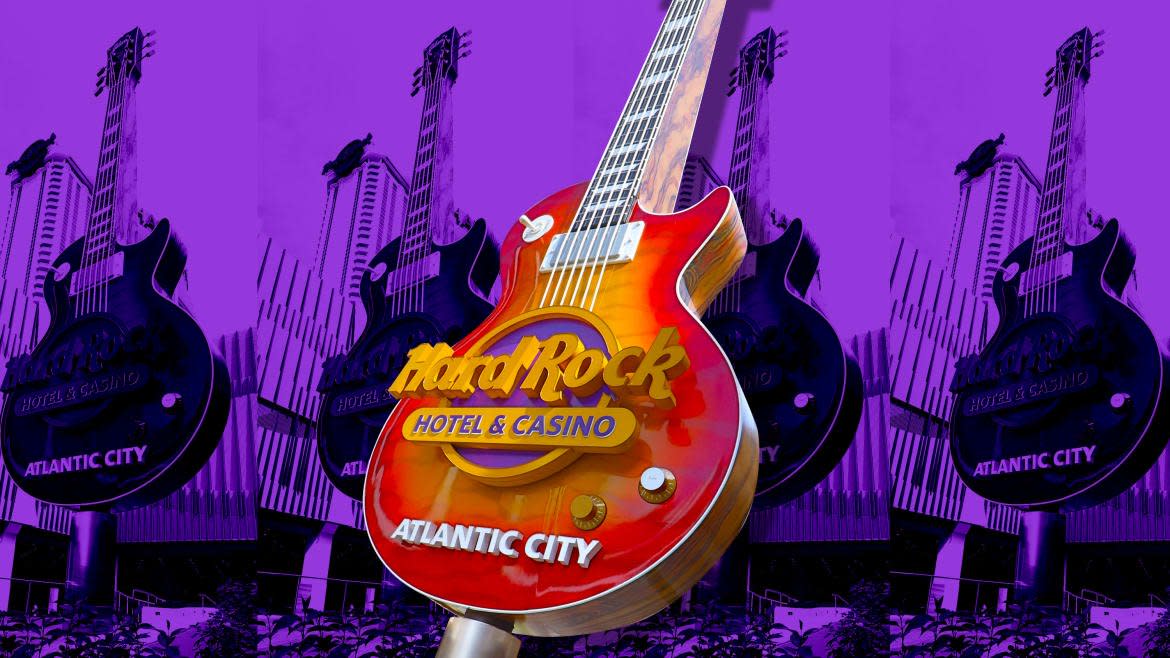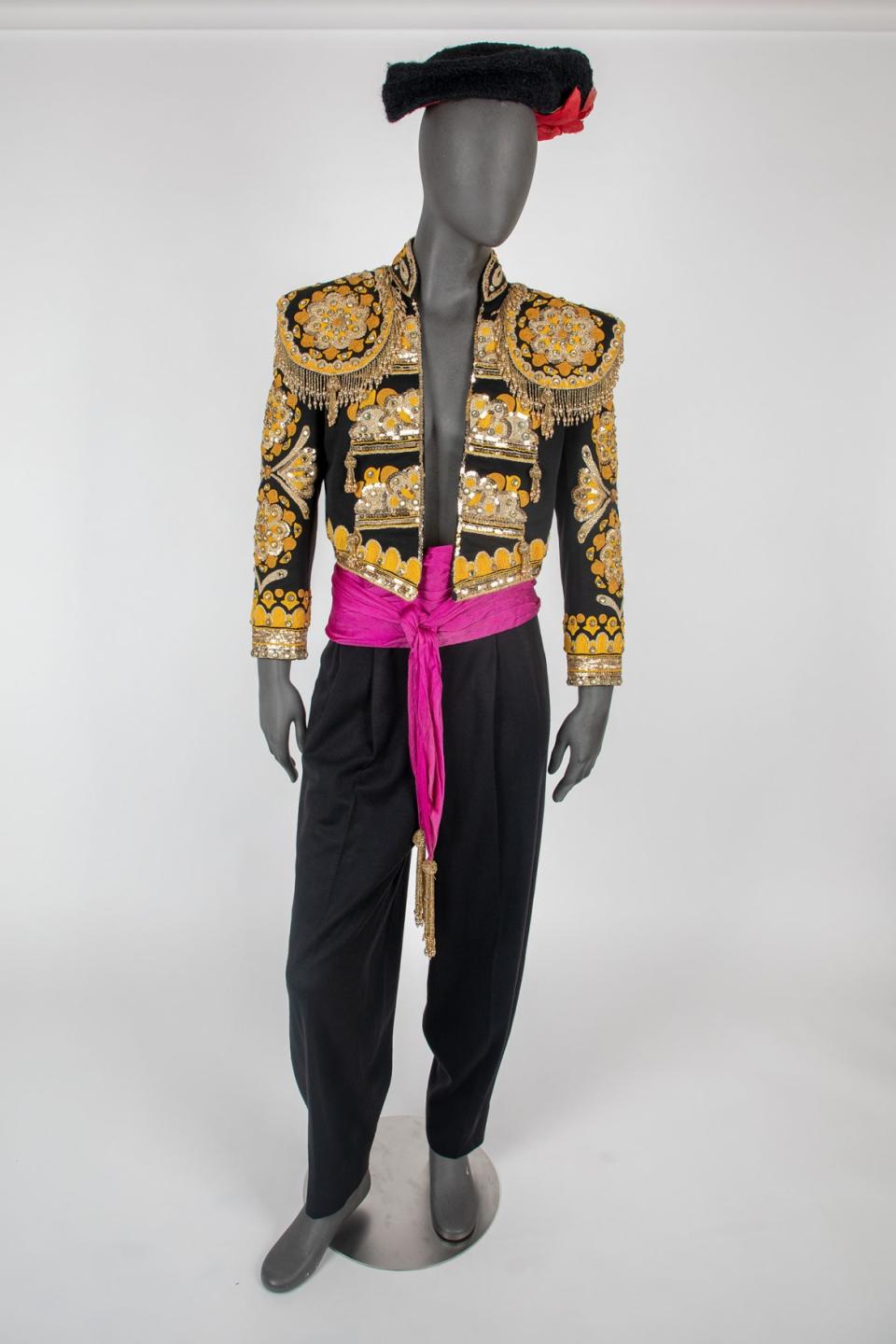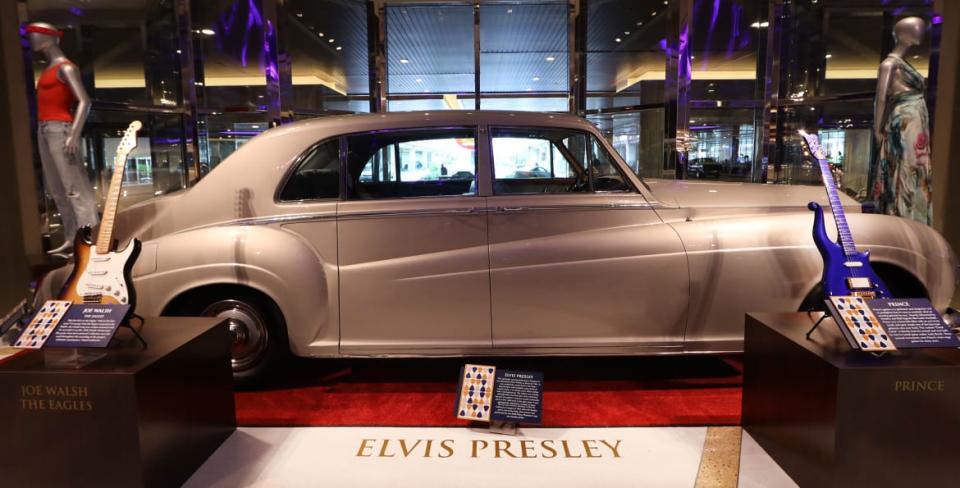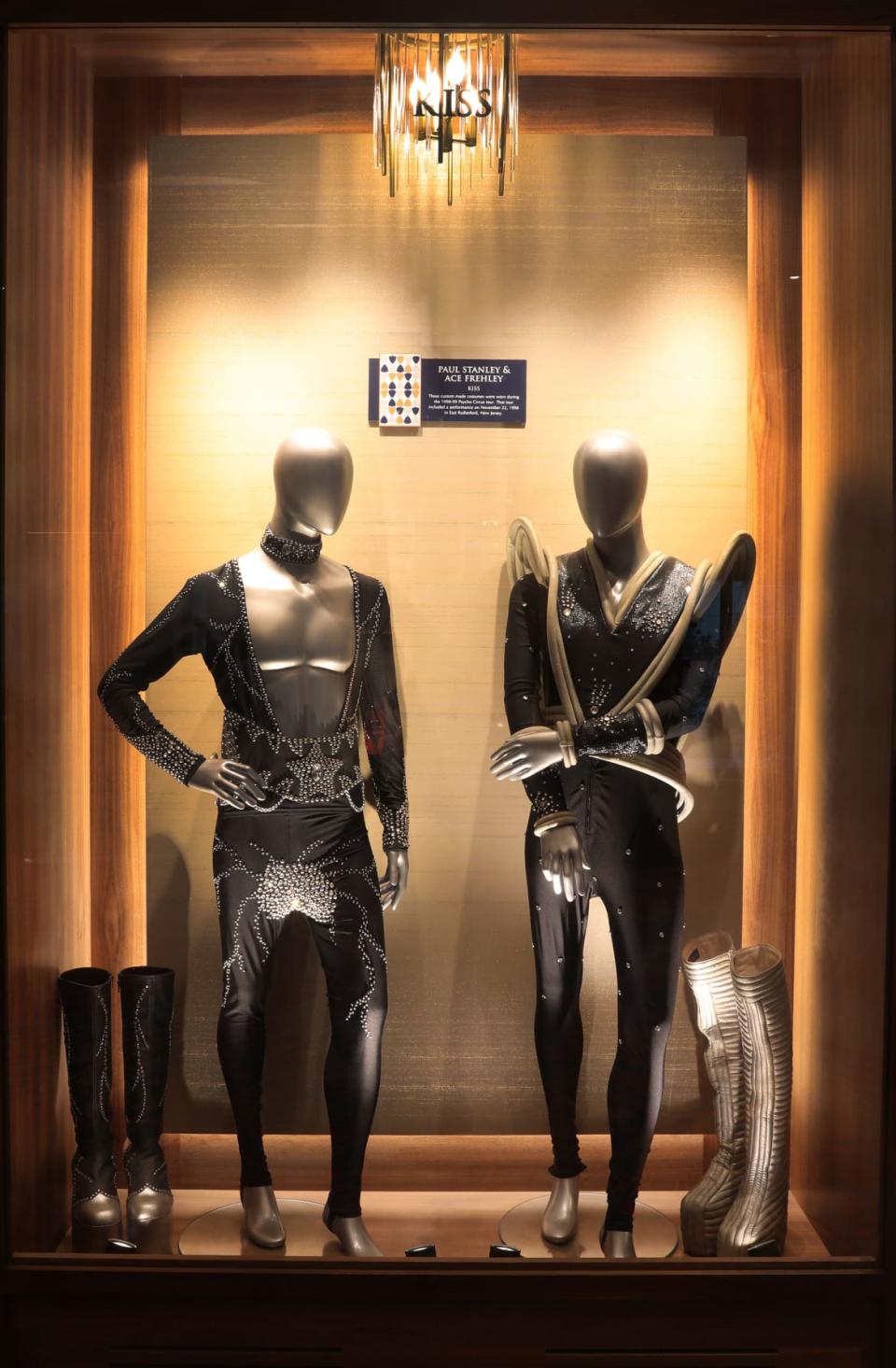Gaga to Elvis: How One Hotel Brand Built a Massive Memorabilia Collection

One year ago this summer, when the Hard Rock Hotel and Casino opened its doors in Atlantic City, it filled its 150,000 square feet with all of the trappings of your typical modern casino—slots, poker tables, high-end restaurants and fast food counters, an expansive spa, luxurious suites, and a bevy of bars to either wash away the pain of your losses or toast your extravagant winnings.
But visitors were also encouraged to gawk at more peculiar items. Remember that time a ’90s-era Britney Spears wore all denim? Her boots from that outfit aren’t far from the blackjack tables.
Ever see the Beatles’ 1968 animated classic Yellow Submarine? A hand-drawn frame used in the production is in the lobby.
Frank Sinatra’s piano, a dress Lady Gaga once flaunted, and cashier checks signed by Tupac Shakur are also peppered around, comprising a collection of music memorabilia that sprawls across several generations and genres. The Hard Rock brand owns approximately 82,000 separate items related to pop music culture, and that gives the chain the distinction of having the largest collection of music memorabilia in the world.
“There are little areas of concentration, but more than likely you can’t walk 50 feet on this property without hitting a piece of memorabilia,” says Adam Zengel, who holds the unique title of Vibe Manager for the Atlantic City property.
Zengel, who’s held a variety of jobs in the music industry, is in charge of the immersive music culture this location boasts, from its museum-quality items to the soundtrack of the property. “When I was offered the job, it was the first time I heard what a Vibe Manager was,” he says. “Music is in Hard Rock’s DNA, and you have to have someone here who’s spent a long time working in it.”
That includes personally curating playlists for 38 separate zones (from the spa to the valet area), booking major live acts for their theaters (Carrie Underwood opened their Hard Rock Live at the Mark Etess Arena, a 7,000 seat space) and smaller acts every day of the year for the outdoor beach bar or lobby area.
“Any part of music that intertwines with our day-to-day operations is something I oversee,” explains Zengel. It’s an expansive gig that also includes the property’s immense collection of memorabilia.
The memorabilia, which provides the foundation for the Hard Rock brand, is funneled to the company’s cafes and casinos around the world from what they dub the Hard Rock Vault. It’s a facility reminiscent of Indiana Jones that houses thousands of artifacts in a secret location somewhere in south Florida.
“This is history,” says Giovanni Taliaferro, Hard Rock International’s director of memorabilia and design who works out of the Vault and oversees the collection. “These are our museum pieces. The Louvre has the Mona Lisa, we have Jimi Hendrix’s Flying V guitar. These are our Picassos. These are our Van Goghs. These are our Monets. This is art, this is our culture and it’s what we pride ourselves on.”

One of Elton John's performance outfits.
Working with the company for the past 16 years, Taliaferro handles the acquisition and research for a constantly evolving inventory. “Whenever we’re opening up a new location, we look at what would be relevant in a market: What artists are from there? Who had an iconic and impactful performance in the area? Luckily for Atlantic City, you have the entire history of New Jersey and the tri-state music culture, so there was a lot to be inspired by.”
The Atlantic City location boasts a guitar donated by Jersey icon Jon Bon Jovi, a motorcycle once owned by the late E Street Band saxophonist Clarence Clemons, and a suit donated by the primo Jersey Boy himself, Frankie Valli. (The eponymous jukebox musical musical is scheduled for an upcoming run in the venue’s performance space).
Exactly how the Hard Rock obtains items, which can be found everywhere from the casino floor to atriums and guest floors, happens in a myriad of ways.
“We have a really good rapport with artists, so there are many instances when they simply donate a piece to the collection since they know we’re going to take good care of it and not turn around and sell it,” explains Taliaferro of the acquisition process. “Or they’ll donate a piece to our collection and if they choose, we’ll make a financial contribution to a charity of their choice in their name. There are also auctions that pop up on a regular basis and we attend those. Or we’ll purchase them outright.”

The latter method is how the Atlantic City location scored Elvis Presley’s 1963 Rolls Royce. Customized for the King, complete with a velvet interior and a then-ultra high tech car phone, it was acquired from a private owner specifically for the Atlantic City location.
“It was the subject of a documentary about the car and Elvis’s legend, and is one of the strongest pieces in our collection,” says Taliaferro of the automobile, which the lobby was designed around. “It still works, and I actually drove it from storage to the property.” (Similarly, the centerpiece for the company’s new Tampa location is Presley’s gold-plated piano.)
One might not expect that a museum’s haul of priceless cultural artifacts would call a casino home, let alone one in sleepy Atlantic City, but welcome to gaming in the modern age. It’s a form of entertainment fighting to lure younger visitors as older, more fervent gamers are dying off. Industry statistics are worrying and largely pin the blame on millennials who, saddled with college debt and grappling with a higher cost of living than their parents, are staying away from casinos in droves.
A 2018 study by the London-based data research firm YouGov found that most millennials think casinos are depressing, with the even younger Generation Z proving to be an even tougher market.
“Casino revenue has now grown to only be a little less than non-gaming revue,” says Hard Rock Atlantic City’s President Joe Lupo. He knows full well that in order to attract visitors, flashier lures beyond slot machines are vital in order to keep the industry afloat.
“Las Vegas showed that there can be revenue produced from non-gaming amenities that attract a more diverse and larger group of people,” Lupo says. “They really changed that reputation and have done it very well.”

Kiss costumes
Still, compounding the decline of casino culture are Atlantic City’s larger problems. Once a top destination, the city’s much-documented troubles include a sharp decline in both stature and visitor-ship, with five of its 12 casinos shuttering between 2013 and 2016 alone.
One of those failed casinos, the Trump Taj Mahal (built in 1990 for $1.2 billion and then-dubbed by the current president as the “eighth wonder of the world”), was sold for 4 cents on the dollar to Hard Rock International in 2017. The thinking went, if there’s any brand armed with bells and whistles to attract a bevy of non-gamblers which can make a casino work in 2019, it’s the Hard Rock.
The company itself, originally launched in 1971 as a simple cafe and purchased in 2007 by the Seminole Tribe of Florida, now counts a global network of 185 cafes, 25 hotels, and 12 casinos. Showing their faith in the property, the company spent a cool $500 million converting the flashy Trump-style building to a haven for music lovers.
“It was a large investment and I think it showed our commitment and how important it was to create a new destination,” says Lupo, who remains optimistic about his property, which and opened in June 2018 after a 15-month transformation. “We’re here for the long run and we wanted to create something special. You just can’t do that with paint, carpet, and tape.”
Paramount to it all, of course, is the memorabilia which despite the brand’s rock moniker, is meant to please fans of all music and not just one genre.
“There’s a bit of a stigma that if we’re called hard rock, we just celebrate rock, but it’s quite the opposite,” says Zengel who notes the company’s delicate genre-spanning balancing act to please younger generations while not turning off its older, more loyal crowd. “We need to be a lot of things to a lot of people.”
As a result, the complex features everything from a cap from the frontman for the ’50s group Dion and the Belmonts (known for the 1959 hit “Teenager in Love”), down to a mask worn by the electronic producer Marshmello (currently on the charts with hits “Happier” and “One Thing Right.”)
Even a year after the Hard Rock’s Atlantic City casino opened, Zengel says he still walks around in awe of the pieces of cultural history that saturate the space.
“We don’t just have any glove, we have one of Michael Jackson’s gloves,” says Vibe Manager Zengel, whose favorite item in the casino collection is a girl’s cheerleading outfit worn by Kurt Cobain for a 1994 Rolling Stone photoshoot mere months before his death. “There are pieces here that have changed your upbringing, your thoughts and your outlook. They’re impactful. If you're a music fan, you’re going to find something here that’s going to evoke a feeling.”
Get our top stories in your inbox every day. Sign up now!
Daily Beast Membership: Beast Inside goes deeper on the stories that matter to you. Learn more.

